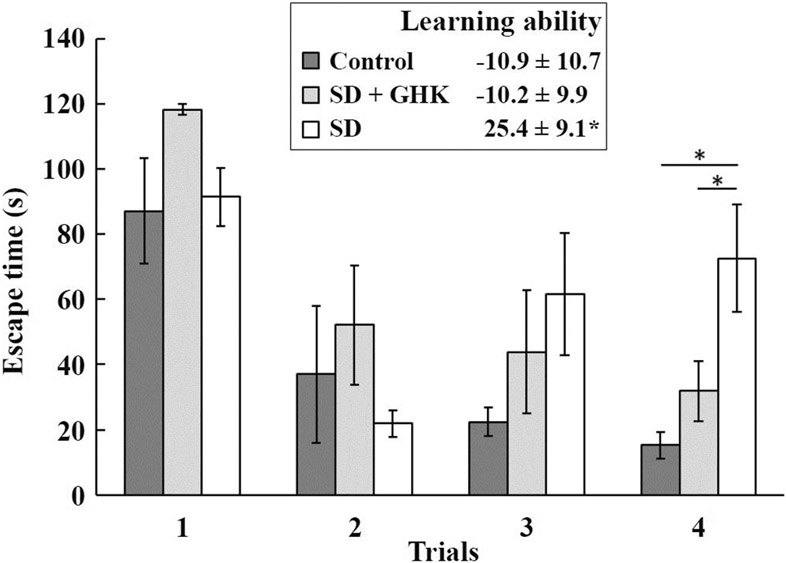University of Washington: Natural Molecule Counteracts Learning and Memory Deficits Induced by Sleep Deprivation
A naturally occurring molecule called a glycyl-L-histidyl-L-lysine (GHK) peptide prevents learning impairments, inflammation, and oxidative stress in sleep-deprived aging mice.
Highlights:
- Injecting sleep-deprived mice with GHK prevents impairments in learning and memory.
- GHK prevents inflammation in the hippocampus — the brain’s memory-consolidating region.
- Oxidative stress — damage caused to cells by excessive oxidant molecules — is prevented by GHK injections.
In many ways, sleep deprivation accelerates the aging process. Like aging, sleep deprivation increases the risk of several high-mortality diseases, including cardiovascular and neurodegenerative diseases. Sleep deprivation also increases the risk of all-cause mortality, meaning that it has the potential to shorten one’s lifespan. Thus, for cases where sleep deprivation is unavoidable, scientists have searched for potential therapeutics to counter its aging effects.
Now, researchers from the University of Washington report in Aging Pathobiology and Therapeutics that the GHK peptide prevents sleep-deprived learning impairment in aging mice. Rosenfeld and colleagues also show that injections with GHK prevent inflammation and oxidative stress — damage caused to cells by excessive levels of reactive oxygen species (ROS) — in the part of the brain responsible for consolidating memories called the hippocampus.
GHK Prevents Memory Loss, Inflammation, and Oxidative Stress
Rosenfeld and colleagues triggered acute sleep deprivation in middle-aged mice (15 months old) by manually preventing them from sleeping. The researchers achieved this by tapping on their cages or gently brushing their backs with a small paintbrush. The mice were kept awake for four extra hours two days in a row.
One group of sleep-deprived mice received 7.5 mg/kg injections of GHK twice daily for five days. These five days included the three days prior to sleep deprivation and the two sleep deprivation days. The other group of sleep-deprived mice did not receive GHK treatment. Both groups of sleep-deprived mice were compared to well-rested mice as a control.
As a result, the untreated sleep-deprived mice took longer to escape a maze designed to test their learning and memory. However, the GHK-treated sleep-deprived mice had escape times comparable to well-rested mice. This indicates that GHK may counteract the learning difficulties associated with sleep deprivation.

(Rosenfeld et al., 2023 | APT) GHK Prevents Learning Impairment. By trial 4, the escape time of sleep-deprived mice injected with GHK (SD + GHK) was similar to normal well-rested mice (Control), which is much faster than the escape time of untreated sleep-deprived mice (SD).
Rosenfeld and colleagues next analyzed the brains of the mice subjected to the maze test. They specifically looked at the hippocampus, the region of the brain that consolidates new memories and is associated with learning. To assess inflammation, they measured a protein called MCP-1, a marker for inflammation. The results showed that MCP-1 was elevated in the hippocampus of sleep-deprived mice. However, GHK treatment prevented this elevation, indicating the prevention of hippocampus inflammation.

(Rosenfeld et al., 2023 | APT) GHK Peptide Prevents Brain Inflammation. In the hippocampus of the brain, inflammation (MCP-1 Intensity) was elevated in sleep-deprived mice (SD). However, injection with GHK (SD+GHK) prevented this inflammation.
Like inflammation, oxidative stress causes damage to organs and tissues, including the brain. Rosenfeld and colleagues assessed hippocampus oxidative stress by measuring a protein called nitrotyrosine. They found that nitrotyrosine was elevated in the hippocampus of sleep-deprived mice. However, this elevation did not occur in sleep-deprived mice treated with GHK, suggesting that GHK prevents hippocampal oxidative stress.

(Rosenfeld et al., 2023 | APT) GHK Prevents Brain Oxidative Stress. In the hippocampus of the brain, oxidative stress (Nitrotyrosine Intensity) was elevated in sleep-deprived mice (SD). However, injection with GHK (SD+GHK) prevented elevations in oxidative stress.
Overall, the findings of Rosenfeld and colleagues suggest that GHK prevents learning and memory deficits from sleep deprivation by preventing elevations in inflammation and oxidative stress that occur in the hippocampus.
Replenishing GHK to Counter Aging
GHK blood levels drop from about 200 ng/mL at the age of 20 to 80 ng/mL by the age of 60. In addition to countering inflammation and oxidative stress, GHK promotes tissue and organ repair by increasing the growth of new blood vessels. Additionally, clinical studies have shown that GHK increases skin repair and regeneration. For these reasons, GHK could be a promising anti-aging therapeutic.
Another well-characterized anti-aging compound, rapamycin, has also been shown to mitigate the cognitive deficits associated with sleep deprivation. The benefits of rapamycin were attributed to vascular health, which GHK also promotes. While further investigation is warranted, it could be that GHK has anti-aging effects similar to rapamycin.
Model: CB6F1 female mice
Dose: Injections of 7.5 mg/kg copper-free GHK twice daily

